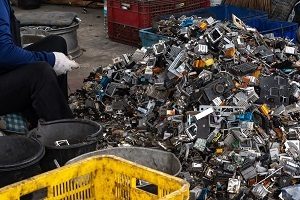
E-recycling Companies Face Unique Pollution Risks
E-waste is the fastest-growing solid waste category globally, and in response, e-recycling has also grown significantly. These recycling businesses focus on reprocessing parts and materials from all kinds of electronic devices and play a vital role in our effort to cope with the environmental impact of technology. Examples of electronic devices being recycled include cell phones, tablets, computers, televisions, and appliances of all sizes. There are substantial pollution risks associated with this industry, so it’s critical for these facilities to follow best practices and have the right environmental coverage.
Many of the materials used in the manufacturing of electronics can be toxic. Common hazardous materials used to make these products include:
- Lead
- Mercury
- Flame retardants
- Phthalates
- Cadmium
- Chromium
- Antimony trioxide
- Polyvinyl chloride
These materials may seep into water sources, soil, and disperse into the air. Some specific issues that arise during the recycling process are:
- Airborne pollutants released while shredding and crushing materials.
- Chemical leaks occur while storing electronics before recycling.
- Disposal of e-waste without proper containment allows leaching into soil or groundwater.
- Chemicals used during the recycling process and stored at the company may be mishandled or spilled.
- Fires erupt, damaging equipment and facility, endangering people, and causing toxic fumes.
- Accidents occur while transporting e-waste.
- Batteries exploding, causing fumes and fires.
- Premises exposures at these facilities as a result of daily operations, including machinery, vehicles, etc.
E-recycling companies may face pollution risks throughout the supply chain, from collection to processing. Adhering to environmental standards is crucial to minimizing risks. However, even a solid risk management program cannot eliminate pollution risks, which is why e-recyclers require specialized environmental coverage.
Here are some examples of claims and lawsuits involving e-recycling companies:
- A California recycling center contributed to pollution in a nearby creek, resulting in a federal lawsuit. In 2021, the company settled with penalties for $310,000.
- In 2018, a Seattle-based electronic waste company paid $83,625 in penalties and $300,00 in beneficial environmental programs for illegal disposal of LCD screens.
- In 2021, a Tulsa, Oklahoma based recycling facility experienced a claim when a lithium-ion battery fell into the belly of a conveyor line, causing a fire and over $2 million dollars in damage. It took seven months to reopen the facility.
We rely heavily on e-recycling facilities to help protect the environment from the environmental damage caused by growing e-waste challenges. These companies must implement green recycling and disposal services, to protect workers, clients, and people in the community. Specialized environmental coverage is critical to protect these companies from the inherent risks of e-recycling processes.
Insurance Coverage for E-Recycling Facilities
Recycling businesses should carry Premises Pollution Liability, which can provide coverage for both on-site and off-site clean-up, defense costs, and third party bodily injury and property damage claims. This coverage is for a property that the insured owns or leases and it provides first party coverage for spills on the insured’s site which is scheduled on the policy. They should also consider Business Interruption coverage, as well as Transportation Pollution Liability for over the road pollution exposures.
For more information, contact us today. Our environmental risk specialists are uniquely positioned to provide your e-recycling clients with the environmental coverage they need.
Type: Blog
Topic: Recycling